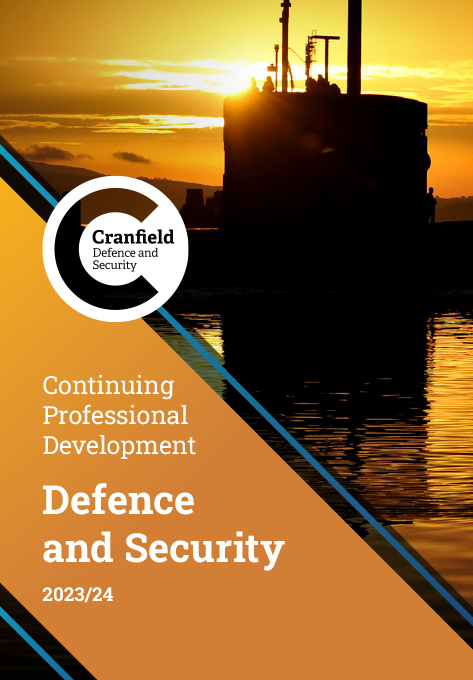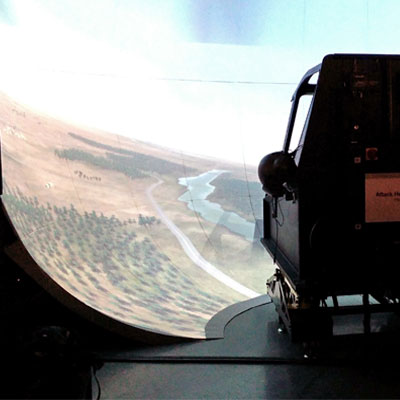The application of modelling and simulation continues to enhance and transform both systems development and training. It allows representation of increasingly complex equipment, systems and scenarios for the purposes of decision support and helps to reduce wear on live equipment and on test and training areas.
Overview
- Start dateSeptember (Full and part-time) / January (Part-time only)
- DurationMSc: one year full-time, up to three years part-time; PgDip: up to one year full-time, up to two years part-time; PgCert: up to one year full-time, up to two years part-time
- DeliveryAssessment is 60% by coursework and 40% dissertation
- QualificationMSc, PgDip, PgCert
- Study typeFull-time / Part-time
- CampusCranfield University at Shrivenham
Who is it for?
The course is suitable for both military and civilian personnel, including those from defence industry and government departments.
Ten places are normally available for the full-time cohort.
Why this course?
On successful completion of the course you will be familiar with the technologies, methodologies, principles and terminology of modelling and simulation as used across defence, including the challenges and issues as well as the benefits. Through use of facilities such as the Simulation and Synthetic Environment Laboratory (SSEL), with its wide range of specialist applications, students will gain a broad understanding of modelling and simulation in areas such as training, acquisition, decision-support, analysis and experimentation.
Informed by industry
The aim of the Industrial Advisory Panel, which is common to all components of the AMOR Postgraduate Suite (which comprises the DSM and MOR courses) is to offer advice and input to the course director and the teaching team in terms of curriculum content, acquisition skills and other attributes that the practitioner community may be seeking from graduates of the course. Currently the Industrial Advisory Panel for this programme has members on it from both the defence industry and the MoD.
Course details
MSc students must complete a taught phase consisting of eight standard modules, followed by an individual thesis in a relevant topic.
Standard modules normally comprise a week of teaching (or equivalent for the limited distance learning options available), followed by a further week of directed study/coursework (or equivalent for part-time and distance learning).
Advanced modules, which enable students to explore some areas in greater depth, are two week (or equivalent for part time) individual mini-projects on an agreed topic in that subject which includes a written report and oral presentation.
Course delivery
Assessment is 60% by coursework and 40% dissertation
Individual project
An individual research project on an agreed topic that allows you to demonstrate your technical expertise, independent learning abilities and critical appraisal skills.
Thesis topics will be related to problems of specific interest to students and sponsors of local industry wherever possible. PgDip students are required to undertake the same taught phase as the MSc, but without the individual thesis. PgCert students must complete the core module (Foundations of Modelling and Simulation) together with five other modules; up to three of these may be advanced modules. Part-time students will typically not study as a cohort, but will follow an agreed individual programme of study, attending courses as convenient.
Modules
Keeping our courses up-to-date and current requires constant innovation and change. The modules we offer reflect the needs of business and industry and the research interests of our staff and, as a result, may change or be withdrawn due to research developments, legislation changes or for a variety of other reasons. Changes may also be designed to improve the student learning experience or to respond to feedback from students, external examiners, accreditation bodies and industrial advisory panels.
To give you a taster, we have listed the compulsory and elective (where applicable) modules which are currently affiliated with this course. All modules are indicative only, and may be subject to change for your year of entry.
Course modules
Compulsory modules
All the modules in the following list need to be taken as part of this course.
Introductory Studies
| Module Leader |
|
|---|---|
| Aim |
To prepare you mathematically and organisationally to study at CDS on the Defence Simulation and Modelling and Military Operational Research Postgraduate programs. |
| Syllabus |
|
| Intended learning outcomes |
On successful completion of this module you will be able to:
|
Foundations of Modelling and Simulation
| Module Leader |
|
|---|---|
| Aim |
To make you aware of the roles, concepts and applications of modelling and simulation in defence, and to understand how to construct simple models. |
| Syllabus |
|
| Intended learning outcomes |
On successful completion of this module you will be able to:
|
Modelling and Simulation Acquisition and Techniques
| Aim |
This module aims to give you an introduction to the wide range of modelling and simulation techniques used in Defence applications, from the basic underpinning principles of their construction through to the challenges and issues in their procurement, acquisition and capability management. |
|---|---|
| Syllabus |
|
| Intended learning outcomes |
On successful completion of this module you will be able to:
|
Real Time Graphics
| Aim |
|
|---|---|
| Syllabus |
|
| Intended learning outcomes |
On successful completion of this module you will be able to:
|
War Gaming and Combat Modelling
| Module Leader |
|
|---|---|
| Aim |
|
| Syllabus |
|
| Intended learning outcomes |
On successful completion of this module you will be able to:
|
Synthetic Environments and Virtual Simulation
| Module Leader |
|
|---|---|
| Aim |
To enable you to understand the issues and challenges in specifying, designing and constructing real-time computer graphics systems, together with their components, with particular reference to interactive virtual environments and simulators as used in Defence. Following on from techniques covered in the RTG Module. |
| Syllabus |
|
| Intended learning outcomes |
On successful completion of this module you will be able to:
|
Experimentation Analysis and Trials for Simulation
| Module Leader |
|
|---|---|
| Aim |
To provide you with the skills to design, manage, analyse and assess simulation based trials in support of training, experimentation and acquisition. |
| Syllabus |
Experimental Design including sampling and ethical considerations, Methodology and analysis of statistical data (Inference, ANOVA and Regression), Definition, Execution, Analysis, Present and Critical assessment of simulation based experimentation and trials reports,
Visiting speakers from MOD and Defence Industry as appropriate to complement coverage of;
|
| Intended learning outcomes |
On successful completion of this module you will be able to:
|
Weapon System Performance Assessment
| Module Leader |
|
|---|---|
| Aim |
To enable you to understand the application of operational research techniques to the assessment of weapon systems. |
| Syllabus |
|
| Intended learning outcomes |
On successful completion of this module you will be able to:
|
Networked and Distributed Simulation
| Module Leader |
|
|---|---|
| Aim |
|
| Syllabus |
|
| Intended learning outcomes |
On successful completion of this module you will be able to:
|
Advanced Module 1
| Aim |
The aim of this module is to allow students to conduct an in-depth study in an area of particular personal interest or relevance to them, in the context of their degree. |
|---|---|
| Syllabus |
|
| Intended learning outcomes |
On successful completion of the module a diligent student will be able, within the individual topic agreed, to:
|
Advanced Module 2
| Module Leader |
|
|---|---|
| Aim |
The aim of this module is to allow students to conduct an in-depth study in an area of particular personal interest or relevance to them, in the context of their degree. |
| Syllabus |
|
| Intended learning outcomes |
On successful completion of the module a diligent student will be able, within the individual topic agreed, to:
|
Advanced Module 3
| Module Leader |
|
|---|---|
| Aim |
The aim of this module is to allow students to conduct an in-depth study in an area of particular personal interest or relevance to them, in the context of their degree. |
| Syllabus |
|
| Intended learning outcomes |
On successful completion of the module you will be able, within the individual topic agreed, to:
|
Networked and Distributed Simulation Exercise
| Module Leader |
|
|---|---|
| Aim |
|
| Syllabus |
A collective group project to:
Note that NDSE typically requires physical attendance at Shrivenham Campus for two weeks. |
| Intended learning outcomes |
On successful completion of this module you will be able to:
|
Thesis
| Module Leader |
|
|---|---|
| Aim |
The aim is to allow the students to develop and apply their skills in their chosen area of study, consolidating their learning and understanding across all elements of the course, through application in-depth to a real-world context of interest to them. |
| Syllabus |
|
| Intended learning outcomes |
On successful completion of this module you will be able to:
|
Teaching team
You will be taught by Cranfield's leading experts with capability expertise, industry knowledge and collective subject research, as well as external speakers from industry and defence. The Course Director is Jonathan Searle. The teaching team includes:
Your career
This qualification will equip you for simulation-specific appointments within the armed forces or government, or in the defence related activities of commercial organisations.
Cranfield Careers and Employability Service
Cranfield’s Career Service is dedicated to helping you meet your career aspirations. You will have access to career coaching and advice, CV development, interview practice, access to hundreds of available jobs via our Symplicity platform and opportunities to meet recruiting employers at our careers fairs. Our strong reputation and links with potential employers provide you with outstanding opportunities to secure interesting jobs and develop successful careers. Support continues after graduation and as a Cranfield alumnus, you have free life-long access to a range of career resources to help you continue your education and enhance your career.
How to apply
Click on the ‘Apply Now’ button to start your online application.
See our Application guide for information on our application process and entry requirements.










